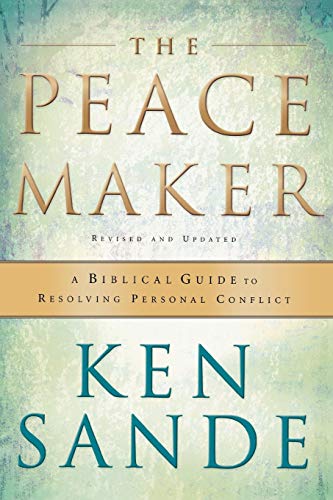
Quotes by Ken Sande
Anytime we long for something apart from God, fear something more than God, or trust in something other than God to make us happy, fulfilled, or secure, we worship a false god.
Reprinted from The Peacemaker: A Biblical Guide to Resolving Personal Conflict, Ken Sande, Baker Books, 3d ed., 2004, p. 109. Peacemaker® Ministries. www.PeaceMaker.net, Used by Permission. Get this book!
The root cause of conflict unmet desires in our hearts. When we want something and feel that we will not be satisfied unless we get it, that desire starts to control us. If others fail to meet our desires, we sometimes condemn them in our hearts and fight harder to get our own way.
Reprinted from The Peacemaker: A Biblical Guide to Resolving Personal Conflict, Ken Sande, Baker Books, 3d ed., 2004, p. 102. Peacemaker® Ministries. www.Peacemaker.net . Used by Permission. Get this book!
Conflict a difference in opinion or purpose that frustrates someone’s goals or desires.
Reprinted from The Peacemaker: A Biblical Guide to Resolving Personal Conflict, Ken Sande, Baker Books, 3d ed., 2004, p. 29. Peacemaker® Ministries. www.Peacemaker.net . Used by Permission. Get this book!
Trusting God does not mean believing that He will do all that you want, but rather believing that He will do everything He knows is good.
Reprinted from The Peacemaker: A Biblical Guide to Resolving Personal Conflict, Ken Sande, Baker Books, 3d ed., 2004, p. 72. Peacemaker® Ministries. www.Peacemaker.net. Used by Permission. Get this book!
Having wisdom does not mean that you understand all of God’s ways; it means that you respond to life God’s way. The better you know the Bible, the wiser you will [become].
Reprinted from The Peacemaker: A Biblical Guide to Resolving Personal Conflict, Ken Sande, Baker Books, 3d ed., 2004, p. 39. Peacemaker® Ministries. www.Peacemaker.net , Used by Permission. Get this book!
Christians are the most forgiven people in the world. Therefore, we should be the most forgiving people in the world.
Reprinted from The Peacemaker: A Biblical Guide to Resolving Personal Conflict, Ken Sande, Baker Books, 3d ed., 2004, p. 204. Peacemaker® Ministries. www.Peacemaker.net. Used by Permission. Get this book!
Forgiveness may be described as a decision to make four promises:
“I will not dwell on this incident.”
“I will not bring up this incident again and use it against you.”
“I will not talk to others about this incident.”
“I will not let this incident stand between us or hinder our personal relationship.”
Reprinted from The Peacemaker: A Biblical Guide to Resolving Personal Conflict, Ken Sande, Baker Books, 3d ed., 2004, p. 209. Peacemaker® Ministries. www.Peacemaker.net. Used by Permission. Get this book!
We take God’s forgiveness for granted [when] we stubbornly withhold our forgiveness from others. In effect, we behave as though other’s sins against us are more serious than our sins against God.
Reprinted from The Peacemaker: A Biblical Guide to Resolving Personal Conflict, Ken Sande, Baker Books, 3d ed., 2004, p. 217. Peacemaker® Ministries. www.Peacemaker.net. Used by Permission. Get this book!
It is important to emphasize the fact that idols can arise from good desires as well as wicked desires. It is often not what we want that is the problem, but that we want it too much.
Reprinted from The Peacemaker: A Biblical Guide to Resolving Personal Conflict, Ken Sande, Baker Books, 3d ed., 2004, p. 104. Peacemaker® Ministries. www.Peacemaker.net. Used by Permission. Get this book!
Most of us think of an idol as a statue of wood, stone, or metal worshiped by pagan people. But the concept of idolatry is much broader and far more personal than that. An idol is anything apart from God that we depend on to be happy, fulfilled, or secure. In biblical terms, it is something other than God that we set our heart on that motivates us, that masters and rules us, or that we trust, fear, or serve. In short, it is something we love and pursue more than God.
Reprinted from The Peacemaker: A Biblical Guide to Resolving Personal Conflict, Ken Sande, Baker Books, 3d ed., 2004, p. 104. Peacemaker® Ministries. www.Peacemaker.net. Used by Permission. Get this book!
To gossip means to betray a confidence or to discuss unfavorable personal facts about another person with someone who is not part of the problem or its solution. Even if the information you discuss is true, gossip is always sinful and a sign of spiritual immaturity.
Reprinted from The Peacemaker: A Biblical Guide to Resolving Personal Conflict, Ken Sande, Baker Books, 3d ed., 2004, p. 121. Peacemaker® Ministries. www.Peacemaker.net. Used by Permission. Get this book!
The world defines success in terms of what a person possesses, controls, or accomplishes. God defines success in terms of faithful obedience to His will.
Reprinted from The Peacemaker: A Biblical Guide to Resolving Personal Conflict, Ken Sande, Baker Books, 3d ed., 2004, p. 253. Peacemaker® Ministries. www.Peacemaker.net. Used by Permission. Get this book!
The Bible repeatedly warns us not to be eagerly looking for opportunities to point out the faults of others. In fact, anyone who is eager to go and show a brother his sin is probably disqualified from doing so. Such eagerness is often a sign of pride or spiritual immaturity, which cripple our ability to minister effectively to others. The best confronters are usually people who would prefer not to have to talk to others about their sin but will do so out of obedience to God and love for others.
Reprinted from The Peacemaker: A Biblical Guide to Resolving Personal Conflict, Ken Sande, Baker Books, 3d ed., 2004, p. 153. Peacemaker® Ministries. www.Peacemaker.net. Used by Permission. Get this book!
Sin needs to be addressed when it is seriously harming the offender, either by direct damage or by impairing his or her relationship with God or other people. Looking out for the well-being of other Christians…is a serious responsibility. Unfortunately, because many Christians have adopted the world’s view that everyone should be allowed to “do his own thing,” some believers will do nothing, even when they see a brother or sister ensnared in a serious sin. This is not the kind of love Jesus demonstrated, nor is it consistent with the clear teaching of Scripture.
Reprinted from The Peacemaker: A Biblical Guide to Resolving Personal Conflict, Ken Sande, Baker Books, 3d ed., 2004, p. 152. Peacemaker® Ministries. www.Peacemaker.net. Used by Permission. Get this book!
Do all you can to be reconciled to others, but remember that you cannot force others to do what is right. If you have done everything within your power to resolve a conflict, you have fulfilled your responsibility to God and may stop actively trying to solve the problem (Rom. 12:18)… It is not necessary or wise to waste time, energy, and resources fretting about someone who stubbornly refuses to be reconciled.
Reprinted from The Peacemaker: A Biblical Guide to Resolving Personal Conflict, Ken Sande, Baker Books, 3d ed., 2004, p. 252. Peacemaker® Ministries. www.Peacemaker.net . Used by Permission. Get this book!
Good listening is particularly important for a peacemaker. It improves your ability to understand others, it shows that you realize you do not have all the answers, and it tells the other person that you value his or her thoughts and opinions. Even if you cannot agree with everything others say or do, your willingness to listen demonstrates respect and shows that you are trying to understand their perspective.
Reprinted from The Peacemaker: A Biblical Guide to Resolving Personal Conflict, Ken Sande, Baker Books, 3d ed., 2004, p. 165. Peacemaker® Ministries. www.Peacemaker.net . Used by Permission. Get this book!
To truly overlook an offense means to deliberately decide not to talk about it, dwell on it, or let it grow into pent-up bitterness. If you cannot let go of an offense in this way, if it is too serious to overlook, or if it continues as part of a pattern in the other person’s life, then you will need to go and talk to the other person about it in a loving and constructive manner.
Reprinted from The Peacemaker: A Biblical Guide to Resolving Personal Conflict, Ken Sande, Baker Books, 3d ed., 2004, p. 83. Peacemaker® Ministries. www.Peacemaker.net . Used by Permission. Get this book!
Good listening…improves your ability to understand others, it shows that you realize you do not have all the answers, and it tells the other person that you value his or her thoughts and opinions. Even if you cannot agree with everything others say or do, your willingness to listen demonstrates respect and shows that you are trying to understand their perspective.
Reprinted from The Peacemaker: A Biblical Guide to Resolving Personal Conflict, Ken Sande, Baker Books, 3d ed., 2004, p. 165. Peacemaker® Ministries. www.Peacemaker.net. Used by Permission. Get this book!
As you worry less about going through conflict and focus more on growing through conflict, you will enhance that process and experience the incomparable blessing of being conformed to the likeness of Christ.
Reprinted from The Peacemaker: A Biblical Guide to Resolving Personal Conflict, Ken Sande, Baker Books, 3d ed., 2004, p. 37. Peacemaker® Ministries. www.Peacemaker.net . Used by Permission. Get this book!
The Bible teaches that we should see conflict neither as an inconvenience nor as an occasion to force our will on others, but rather as an opportunity to demonstrate the love and power of God in our lives.
Reprinted from The Peacemaker: A Biblical Guide to Resolving Personal Conflict, Ken Sande, Baker Books, 3d ed., 2004, p. 31. Peacemaker® Ministries. www.Peacemaker.net . Used by Permission. Get this book!
To some, conflict is a hazard that threatens to sweep them off their feet and leave them bruised and hurting. To others, it is an obstacle that they should conquer quickly and firmly, regardless of the consequences. But some people have learned that conflict is an opportunity to solve common problems in a way that honors God and offers benefits to those involved.
Reprinted from The Peacemaker: A Biblical Guide to Resolving Personal Conflict, Ken Sande, Baker Books, 3d ed., 2004, p. 22. Peacemaker® Ministries. www.Peacemaker.net . Used by Permission. Get this book!

